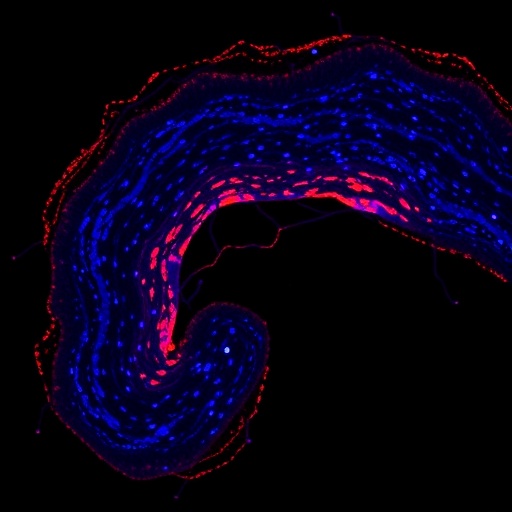A recent study has unveiled the pivotal role of the EYA1 gene in promoting tumor angiogenesis specifically within the context of colorectal cancer. The research, conducted by a team led by Cai et al., highlights how EYA1 influences the tumor microenvironment by activating the hypoxia-inducible factor 1 beta (HIF-1β). This activation is notably facilitated by a specific demethylation process involving the lysine-specific demethylase 2 (LSD2), which targets the histone mark H3K4me2. The findings of this study open new avenues in our understanding of colorectal cancer and its complex biological interactions.
Colorectal cancer remains a leading cause of cancer-related deaths, necessitating the identification of novel therapeutic targets. The presence of tumor angiogenesis, the formation of new blood vessels from pre-existing ones, is crucial for tumor growth and metastasis. This process is heavily regulated by angiogenic factors, and the new evidence supporting EYA1’s involvement adds a critical piece to the cancer biology puzzle. EYA1 acts as a transcriptional co-activator, which enhances the expression of pro-angiogenic factors, thereby orchestrating the angiogenic response in tumors.
One of the most fascinating aspects of EYA1’s role lies in its regulation of HIF-1β, a central player in the cellular response to hypoxia. Under low-oxygen conditions, HIF-1β promotes the expression of various genes that aid in angiogenesis. The study revealed that EYA1 enhances HIF-1β transcriptional activity, which leads to increased levels of vascular endothelial growth factor (VEGF). VEGF is a potent angiogenic factor that stimulates endothelial cell proliferation and migration, thus facilitating the formation of new blood vessels necessary for tumor sustenance.
The molecular mechanics behind this process involve the demethylation of histones, specifically mediated by LSD2. Histones are proteins around which DNA winds, influencing gene expression through chemical modifications such as methylation. LSD2’s role as a demethylase is particularly interesting; it removes methyl groups from H3K4me2, a mark associated with active transcription, thus enhancing the transcription of HIF-1β. This mechanism elegantly illustrates how EYA1, via LSD2, can alter the epigenetic landscape in colorectal cancer, ultimately promoting tumor angiogenesis.
In colorectal cancer cells, the expression of EYA1 correlates with increased angiogenic activity, suggesting that targeting EYA1 could be a promising strategy in cancer therapy. Researchers used various in vitro and in vivo models to demonstrate that silencing EYA1 led to a significant reduction in the expression of angiogenic factors and a concomitant decrease in endothelial cell proliferation. This reduction logically translates to diminished tumor growth and metastasis, reinforcing the idea that EYA1 serves as a potential therapeutic target.
This study not only elucidates essential molecular interactions within colorectal cancer but also establishes a foundation for future therapeutic interventions. By inhibiting EYA1, it may be possible to disrupt the angiogenic capabilities of tumors, providing a novel approach to cancer treatment that could improve patient outcomes. Furthermore, understanding the specific pathways and mechanisms that underlie these interactions can lead to the development of small molecules or biological agents that effectively target EYA1 and its associated pathways.
The clinical implications of these findings are profound. Current therapies often target existing angiogenic pathways but may overlook other critical regulatory mechanisms such as those involving EYA1 and LSD2. By focusing on these newer targets, researchers may develop more robust and effective treatment options. The findings could pave the way for clinical trials aimed at assessing the safety and efficacy of EYA1 inhibitors in patients with colorectal cancer.
Moreover, the role of epigenetics in cancer biology cannot be overstated. The demethylation processes facilitated by LSD2 emphasize how modifications at the histone level can translate into significant changes in gene expression. With an increasing understanding of these epigenetic regulators, there is a potential to develop therapies that not only target DNA but also the proteins affecting gene accessibility and expression.
Future research will undoubtedly seek to explore the broader implications of EYA1’s role in other cancer types as well. While colorectal cancer serves as the focal point of this study, EYA1’s involvement in other malignancies could open new pathways for understanding tumor biology across a spectrum of cancers. The cross-talk between EYA1, LSD2, and various other signaling pathways could reveal intricate networks that govern tumorigenesis.
As the landscape of cancer research continues to evolve, studies like that of Cai et al. are critical in shaping our understanding of complex biological systems. This research emphasizes the necessity of investigating less conventional pathways that contribute to tumor progression in order to formulate effective treatment strategies. There remains optimism that interventions targeting these new axes of tumor biology will lead to breakthroughs in the management of colorectal cancer and potentially other malignancies as well.
The collaborative effort of the research team reflects the interdisciplinary nature of modern cancer research, integrating molecular biology, genetics, and therapeutic development. Their results call for further exploration and validation in clinical settings. As we strive towards personalized medicine, understanding the nuances of tumor biology will be essential in tailoring effective interventions for individual patients.
In summary, the role of EYA1 in promoting angiogenesis through HIF-1β activation and LSD2-mediated demethylation presents a powerful narrative about the intricacies of cancer progression. Continued research in this domain will likely yield significant insights that could eventually transform therapeutic approaches to colorectal cancer and beyond. This work serves as a stepping stone toward a deeper understanding of cancer biology, with the potential to impact clinical strategies aimed at combating one of the most challenging health crises of our time.
Subject of Research: EYA1’s role in tumor angiogenesis in colorectal cancer.
Article Title: EYA1 promotes tumor angiogenesis in colorectal cancer by activating HIF-1β through LSD2-mediated H3K4me2 demethylation.
Article References:
Cai, S., Wu, J., Wang, N. et al. EYA1 promotes tumor angiogenesis in colorectal cancer by activating HIF-1β through LSD2-mediated H3K4me2 demethylation. J Cancer Res Clin Oncol 151, 278 (2025). https://doi.org/10.1007/s00432-025-06270-2
Image Credits: AI Generated
DOI: 10.1007/s00432-025-06270-2
Keywords: EYA1, tumor angiogenesis, colorectal cancer, HIF-1β, LSD2, demethylation, VEGF, epigenetics.




